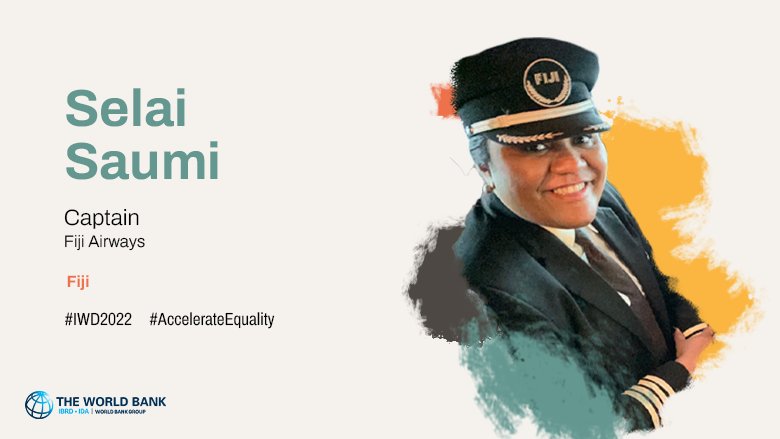My dad was an airline pilot. I was four-years-old the first time I got on a plane - it was when my dad was studying for his private pilot license. He was learning to fly on a Cessna plane around islands in Fiji. I was his co-pilot, so I'd be in the front with him, and my mom and my two sisters in the back.
Focused, good sense of humor and analytical. I don’t want to say over-thinker because that’s what my husband would say!
Firstly, being studious - because flying is a craft that is always evolving. It’s never set in stone. The weather is always changing. There’s a common saying amongst aviators that ‘knowledge is power’.
You must be resilient. You can aim for a good outcome, but the variables are always changing. And you must be a good communicator, especially if the other party isn’t quite grasping critical information that really needs to get through.
When you're assuming any position, you've got to prepare. Preparation is key. The hard yards are important. It’s those late nights studying, or early morning pickups at 3am that can make the difference. There have been long days of studying starting at 6am and finishing at 6pm. Little by little, you climb that mountain. Before you know it you're at the top of the mountain and you have no idea how you got there.
Remember the little things. Put in the time to read and increase your knowledge. I was once told by an instructor that when you’re on time you’re ten minutes late. It’s all about preparing. That is bigger than the role.
Flying my mum to Hawaii for a holiday! Another highlight was seeing two of my female colleagues become captains in 2021. Captain Seini Cornish became the first female wide-body captain on the A330 Airbus, and Captain Christina Zoing got her captaincy on the Boeing 737 Max aircraft. Last year was a highlight in terms of women making their mark in aviation in Fiji.
Another memory that stands out is flying to Melbourne. There was a bit of turbulence and I got on the intercom and was updating passengers, saying things like, “We’re just going through this area”. We landed in Melbourne, and one of the older gentlemen came up to me and said, "Oh, thank you so much, we've never experienced such an informed flight. You calmed my wife”. I think that caring ability is often innate in women.
I think they should be put in key roles and those in leadership positions should be put into key training positions. From an outside perspective it shows authenticity. That will show to others that they are meant to be there and what they can contribute is invaluable and priceless.
We have shown that it can be done. Appointing female captains has weakened stereotypes and old ways of thinking. It’s no longer such a far-fetched idea that a woman can command an aircraft and then come home and cook dinner for her family.
In a negative sense, we are still the minority. I started when I was 18 years-old, so 20 years ago, and women only made up one percent of pilots worldwide. Globally, women now make up five to six percent of pilots. That’s something I hope will change, and it starts with marketing those positions better to women to show that it’s not just a male-only industry.
I would encourage them to believe in themselves and their ability to learn the craft. To know it better than the next person. It’s something that is new to everyone, especially in the Pacific.
I trained in Brisbane and chose to return to Fiji, and it was very new even then. Other women that had become pilots were expatriates and not local. Train, come back and pioneer something. What you lack in skill initially you can make up for in enthusiasm and effort, and, if anything, just keep going.
**The views expressed in this interview do not necessarily represent the views of the World Bank Group.

